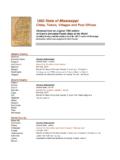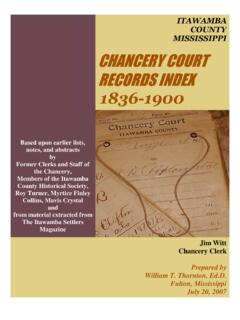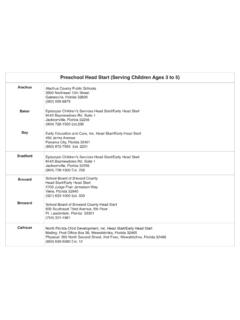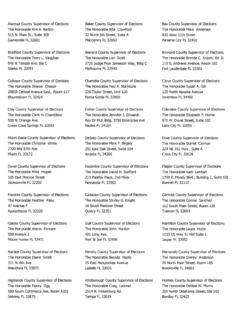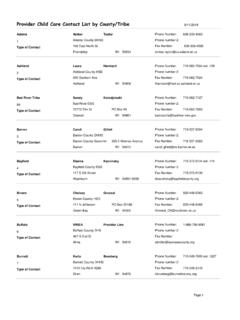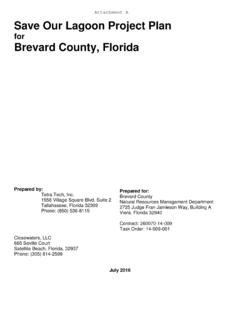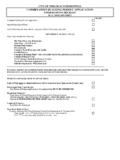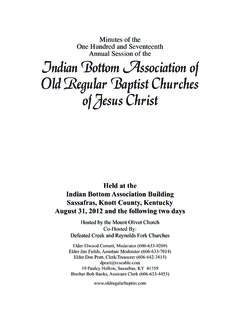Transcription of Compiled and Edited by Bob Franks
1 Compiled and Edited by Bob Franks EARLY DEEDS OF ITAWAMBA county , MISSISSIPPI: 1836-1839 Including A Brief History of Early Itawamba county and Using Maps With Your Itawamba Deed Research Copyright 2008 The Itawamba Historical Society EARLY DEEDS OF ITAWAMBA county , MISSISSIPPI 1836-1839 including A History of Early Itawamba county and Using Maps With Your Itawamba Deed Research Compiled and Edited by Bob Franks For The Itawamba Historical Society The deeds in this book were abstracted by Maxine Roberts Smith and Bob Franks from the originals found in Deed Book 1 and Deed Book 2 located in the Itawamba county Chancery Court Clerk s Office, Fulton, Mississippi. The Early History of Itawamba county and Deed Tutorial sections were written by Bob Franks Copyright 2008 The Itawamba Historical Society Early Deeds of Itawamba county , Mississippi 1 Introduction and Early History of Itawamba county he deeds in this book represent the first land buyers of Itawamba county , Mississippi covering the years 1836 through 1839.
2 The Chickasaw Cession opened up a vast area of land in northern Mississippi and settlers - many from the Carolinas, Georgia, Tennessee, Alabama and older parts of Mississippi, rushed to buy land in this new territory. Included in this group of land buyers were also land speculators wishing to make a profit, who purchased vast tracts of land for resale at a later date. Many of these land speculators were from such places as New York City and Mobile. A beneficial study of the first deeds recorded in Itawamba county would be inadequate without a brief history of the founding days of Itawamba county . Such a history can serve as a useful background for those studying the lives and times of those first Itawamba county land buyers. The Organization of Itawamba county n February 9, 1836, the Mississippi Legislature divided the land secured from the Chickasaws into various counties. On February 14, 1836, the Legislature appointed commissioners in each of the ten newly created counties to get the counties organized.
3 The commissioners appointed for Itawamba county were James Rowland, William Coats, Lewis Gideon and David Walker. As instructed by the Legislature, these commissioners called for an election and five men were elected: James Spears Bourland, Alfred G. Lane, John Beene, Spearman and Eliba Allen. These men were known as the Board of Police. The Board of Police called an election and the following men were elected as officers for the new county of Itawamba: Charles Warren, sheriff; Ritchie, probate judge; Lewis Gideon, probate clerk and Russell O. Beene, circuit clerk. With the organization of the county came a large influx of trans-Appalachain settlers. The 1836 tax list of the county shows there were approximately 280 families living in Itawamba county . The Board of Police were empowered by the Legislature to select the site of county government, which was to be in the center of the county - if a suitable T O Copyright 2008 The Itawamba Historical Society Early Deeds of Itawamba county , Mississippi 2 location, and to acquire this location either by purchase or donation.
4 A deed recorded in Deed Book 1, Page 53, shows that a Chickasaw sold Section 25, Township 9, Range 8 East to Kenneth Clark, John Miller and Robert Miller, land speculators living in adjoining Pontotoc county . They, in turn, donated 50 acres of this land to the Board of Police for the site of county government on July 17, 1837. The new site of county government was named Fulton, in memory of Robert Fulton, inventor of the steamboat, and by 1838 lots were being sold in this new town. John Thompson was the first postmaster for the site of county government. Some of the first lot buyers in the new village of Fulton were John M. Cox, David Patrick, Wiley W. Gaither, James C. Wright, Edward Moore, John R. Wren, William Peacock, John L. Collins, David Files, William Files, Lemuel Beene, Joseph Calvin Clark, William Eckford, Wiley D. Clifton and John Thompson. Before Fulton was organized, county government affairs were conducted in private homes and stores including the store house of Elisha Thomas at Van Buren on the Tombigbee River and the home of James Spears Bourland in the Cardsville After Fulton was organized county government business was conducted in private stores and residences in Fulton.
5 As late as January of 1838, circuit court was held in the "ward house" of Duncan Clarke, Esq. in the new village of Fulton. It is not known when the first courthouse was built in Fulton, but records show that there was a courthouse in Fulton before 1843. More than likely it was a typical pioneer wooden structure. Pioneer Days in the New county ost of the early settlers in Itawamba county were from the hill regions of Alabama, Georgia, South Carolina and Tennessee. These people were from places where slavery was practically non-existent. Consequently few slaves were in Itawamba county . Circuit Court records show a man being tried in 1837 for "bringing a Negro woman, Tabby, into the county and selling her. He was not convicted because slavery, even though unpopular with several Itawambians, was perfectly legal in Mississippi. Upon entering Itawamba county from long-settled areas, many people had a hard time adjusting to the new territory. In 1839, Josiah Hinds, an early pioneer of Itawamba county wrote in his diary: "We are among strangers in a strange land, and in a wilderness, where but a short time since, was heard the yell of the savage, and where the hoot of the owl and prowl of the wolf is still heard.
6 We are almost M Copyright 2008 The Itawamba Historical Society Early Deeds of Itawamba county , Mississippi 3 in the woods - one cabin only to shelter us and our little ones and a rail pen for a smoke house and churches for the worship of God." Henry Wiygul moved north into the region that became Itawamba county in 1832 from Cotton Gin Port in neighboring Monroe county . On 11 November 1925, William Wiygul wrote: "In 1832 Granpa Wiygul decided he would move up into the wild woods where Itawamba county now is. He got him an ox and a sack of something to eat and started on an ox to blaising out his road wright up the ridge. He went back and got his family. He had a yoak of stears and a waggon and put his household stuff on it. He was living in Monroe county then. It was a county . In the early fall of 1832 he started. he soone got out of Monroe county into the wilderness where no one lived but Indians. He got to the end of his road and settled.
7 He lived there in a Indian hut about two yeares. he then built a house out of logs." In 1841 members of the Tannahill family of Scotland immigrated to the new county of Itawamba. After coming down the Tennessee River they landed at Eastport in the new county of Tishomingo. A letter dated January 19, 1842 from Fulton to England recollects the journey to Itawamba county : "..on a Sunday night we landed at the town of Eastport (containing four log cabins) and the next day we started through the Forest Track for Fulton, Mary mounted on horseback and Robert and I on foot. I carried my gun, but got no chance to shoot. We saw some deer, but they did not allow us to get near them. It was a most awful night at Eastport. By the help of poles to steady us, Mary and I got up the bank and got lodging that night in a cabin. The people said they had never seen such a thunderstorm. We did not sleep much. There was in the same room, three men and two females. This is the universal practice here -- no separate sleeping appartments.
8 We lay and listed to the thunder rolling overhead and the lightning flashing through a hundred chinks in the we got to Mr. T's (Joshua Toomer in Fulton), we found all our people well except There is very little money current here. Mr. T. is glad to have the yearly accounts of the farmers settled by the cotton which can be turned into specie at wrote this in my own log cabin, which barring a few chinks is not a bad country here is but thinly settled as it is only six years since the Indians left live on bread of Indian corn which is the only kind used here. Their hogs are excellent being fed in the woods on nuts and men here are not merely nominally but really equal. The other day a man was taken up here for going to shoot a neighbour. The sheriff allowed him to go at large about the rode about the town, whooping, crowing like a cock and dared the officer at the point of a knife to lay a hand on men have been shot in Mr. Toomer's As illustrated above, life in pioneer Itawamba county was indeed primitive and harsh.
9 On October 21, 1843, Josiah Hinds wrote in his diary: "Two of our candidates for representative took a little too much firewater at court last week and one of them concluded to call off the dogs and quit the drive and has left the field in disgust. One of the drunken candidates took the stand in the courthouse on Monday, and after Copyright 2008 The Itawamba Historical Society Early Deeds of Itawamba county , Mississippi 4 abusing one of our preachers at a dreadful rate, left the courthouse and made his way to the doggery and got as drunk as Bacchus." Hinds writes in his diary three months later: "Was at Fulton yesterday. Had to wade through Bigby Swamp. Got wet and don't feel well. They were swilling down the devil's firewater; saw one poor drunken fellow with his face very much scratched and bleeding. Had been " Houses in pioneer Itawamba county were generally built of logs and hewn with the broad ax after being raised.
10 Sometimes the logs were lined on the ground and hewn, if the builder wished to make an extra nice house. Poplar trees were widely used for pioneer house building in Itawamba county . The floors were made of puncheons, which were logs split the whole width of the tree and then dressed off with the adz. The coverings for the houses were usually four feet boards usually made of cypress or oak. Lighting in the home during pioneer days was very primitive. Lights for the kitchen and dining table were made by dipping a piece of cloth cut into a string, into an earthen vessel with a small lip, where the end of the wick rested. The vessel was filled with lard and the end of the cloth was set afire. Tallow candles were also used for lighting. During the 1840s very few pioneer women worked in the fields. They worked in the house spinning thread, weaving cloth and cooking for the usually large families. The women made all clothing for the family. The men in the household worked in the fields, where everything needed for home consumption was raised.
